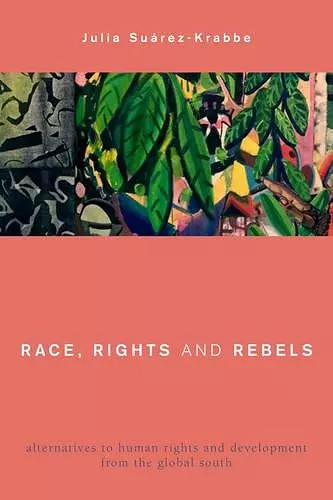Race, Rights and Rebels
Alternatives to Human Rights and Development from the Global South
Format:Hardback
Publisher:Bloomsbury Publishing PLC
Published:16th Dec '15
Currently unavailable, and unfortunately no date known when it will be back
This hardback is available in another edition too:
- Paperback£40.50was £45.00(9781783484614)

Human rights and development cannot be understood separately. They are historically connected by the idea of race, and have evolved concomitantly with the latter. As the tools of race, human rights and development have been forged in the effort to legitimize and maintain coloniality.
While rights and development can be used as tools to achieve protection, specific political goals, or access in the dominant society, they limit radical social change because they are framed within a specific dominant ontology, and sustain a particular political horizon. This book provides an original analysis of the evolution of the overlapping histories of human rights and development through the prism of coloniality, and offers an important contribution to the search for alternatives to these through the lens of indigenous and other southern theories and epistemologies. In this effort, Julia Suárez-Krabbe brings new perspectives to discussions pertaining to the decolonial perspective, race, knowledge, pluriversality, mestizaje and identity while elaborating on original philosophical concepts that can ground alternatives to human rights and development.
Race, Rights and Rebels is a tour de force in decolonial studies. It unmasks imperial reason and bad faith hidden within modernist tropes of human rights and development and reveals how these celebrated discourses sustain the modernist death project. With this work, Suárez-Krabbe establishes herself as one of the most consistent and compelling advocates of decolonial historical realism’s ‘good faith’ and a decolonial humanist fighting for genuine pluriversalism. I have nothing but praise and admiration for this theoretically sophisticated and excellent work. -- Sabelo J. Ndlovu-Gatsheni, author of "The Decolonial Mandela: Peace, Justice and the Politics of Life" (2016) and "Epistemic Freedom in Africa: Deprovincialization and Decolonization" (2018)
In this beautifully written book, Suárez-Krabbe incisively critiques the colonial genealogies of human rights and development. But she does more. By carefully working with indigenous traditions of the Columbian Caribbean, Suárez-Krabbe considers ways of being and knowing that address differently the seminal problems of the colonial "death project", as termed by the Nasa people. The book is ethically engaged, deeply challenging, and therefore a must-read for scholars of human rights, development and beyond. -- Robbie Shilliam, Queen Mary University of London, Reader in International Relations
This book is a brilliant exercise in decolonizing the social sciences. It takes off from what has already been accomplished by decolonial scholarship to move forward into more innovative and uncharted territories. Julia Suárez-Krabbe takes as her intellectual and existential guides the sages of indigenous peoples from Colombia. This is a path-breaking book on a decolonial vision and analysis of mestizaje, the best I have read in years. It is self-reflective to such a point that its lucidity is as illuminating as it is disturbing. -- Boaventura de Sousa Santos, University of Wisconsin-Madison
ISBN: 9781783484607
Dimensions: 235mm x 160mm x 21mm
Weight: 499g
212 pages